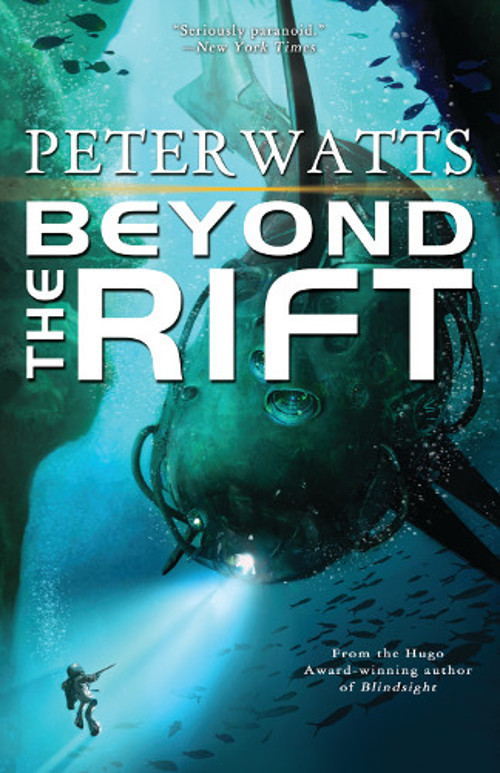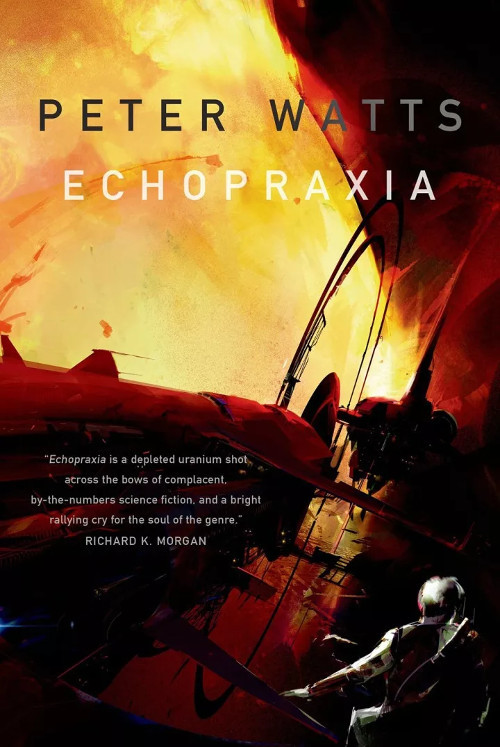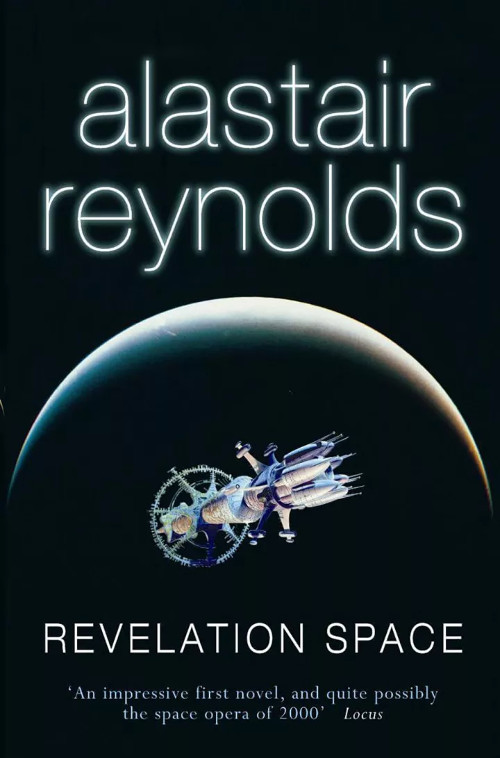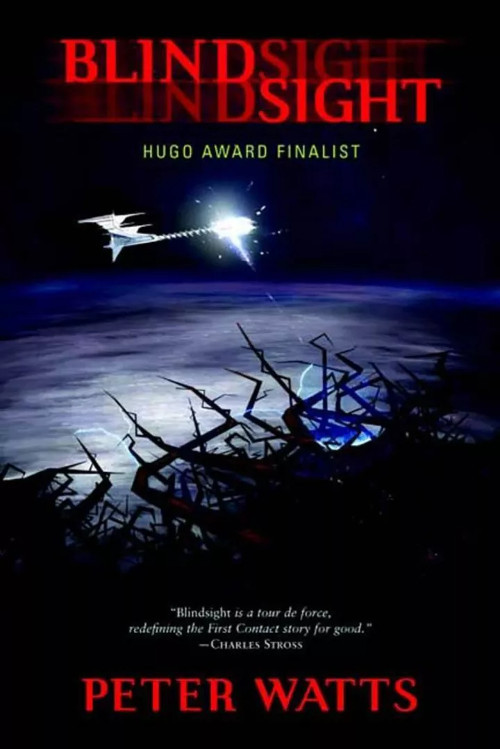Tachyon tidbits featuring Jacob Weisman, Peter Watts, Harlan Ellison, and Alastair Reynolds
The latest reviews and mentions of Tachyon titles and authors from around the web.

Jacob Weisman, Peter Watts (Allan Weiss), Harlan Ellison (Mark Hanauer/Corbis Outline), and Alastair Reynolds (Barbera Bella)
For KIRKUS REVIEWS, John DeNardo interviews for five publishers, including Tachyon head honch Jacob Weisman about How Small Press Publishers Shape the Field of Science Fiction and Fantasy.
JACOB WEISMAN: I didn’t start out to be a book publisher. Magazines and newspapers were my calling. I worked on every school newspaper I could, edited a literary magazine in college, and graduated to internships with Asimov’s and Locus. (In retrospect it’s not surprising, with all of my magazine experience that Tachyon has done so well with our anthologies and short story collections.)
I started by publishing a small zine that included fiction, essays, poetry, book reviews, and record reviews. Today it would be a blog. But the experience of putting together print publications was very formative. There’s nothing quite like cobbling together a magazine by hand using knives, waxes, light boards, line tape, and barely functional computer equipment with extra-large floppy discs.

I always loved sf and when the opportunity came to publish a few books on my own, I took it. Early on, I was influenced by all the classic small presses: from Gnome, Arkham House, and Shasta to NESFA and Pulphouse. The early small presses, which started up before the majors entered the field in the 1950s, sought to preserve classic works of sf. That’s what we did early on, publishing works by many of the pioneers of sf: Stanley G. Weinbaum, Ward Moore, Clifford D. Simak. But it wasn’t long until we were publishing newer works by Jack McDevitt, Peter S. Beagle, and Michael Swanwick.
And that’s what we’re still doing today, only with novels and novellas in addition to collections and anthologies, with new books in the works by Peter Watts, Joe R. Lansdale, James Morrow, Ellen Klages, Lauren Beukes, Peter S. Beagle, and Bruce Sterling, among others.
Peter Watts contributes his take for CLARKESWORLD’s regular column “Another Word.”
I’m told they only want one thing for this column. No critique, no crunchy science, none of the stuff I push on my blog or Nowa Fantastyka. ”Another Word” serves exclusively as a showcase for essays “tied closely to your professional involvement in the community.”
Ew.

How to do stuff, in other words. How to maximize your odds of success: what fresh markets to explore, what tech to embrace, what habits to cultivate. And these insights, in turn, comprise the merest fraction of a vast and ever-growing archive of Received Wisdom from the Elders: the Clarion calls, the self-help books, the beta readers and writing groups and university courses taught by bitter Humanities profs who never made it out of the small presses.
There’s a lot of it out there, whole libraries of the stuff. And yet when I sift through it in search of something useful to say I come up empty—because I never did most of those things, and when I did I usually sucked at them. I did pretty much everything wrong.
I think I still do.
While OMNI’s Matt Cates selection of Most Terrifying Sci-Fi Books didn’t include any Tachyon publications, it did feature several of their authors.

Where better to begin than here? The title alone is enough to creep somebody out! Harlan Ellison’s Hugo Award-winning novel, published in 1967, features the precursor to many an evil artificially intelligent nemesis—the sublimely malicious supercomputer “AM,” in this instance. Life, if it may be called such, began for AM after the Cold War ended in the destruction of mankind. The three guilty superpowers each built their own “Allied Mastercomputer” to run what was left of their societies, but, as so often happens, one of the A.I.s became sentient and decided to combine with the other two. From there, the now unified AM took it upon itself to finish what the humans started, and wipe out the remains of humanity. Getting in touch with its inner cruelty-side, AM decides to keep a handful of persons alive, and to in fact make them immortal—just so it can torment them for eternity by messing with their minds in very sadistic ways. AM can, however, also alter their physical appearances, and turns one of the men into a grotesque ape… simply out of boredom! But AM saves the best for last, and from its coded depravity comes the title of this novel, the whole of which Ellison churned out in one fever-dreamed evening!

Let’s go crazy—because you’re going to need an altered state of mind to get through Peter Watts’ bizarrely populated world, an unrecognizable Earth in the not-too-far future. People aren’t what they used to be, literally. The protagonist, Daniel Brüks, is the last unaltered man, and he’s sick of his mutated fellow people. He’s also mired in a good deal of guilty conscience, since his work in biology has led to several deaths at the hands of terrorists who’ve exploited his research. But old Brüks can’t catch a break and soon finds himself embroiled in a battle between brain-tweaking, super-intelligent monks and remote-controlled zombies. One thing leads to another and Brüks lands onboard a spaceship (the Crown of Thorns) piloted by a voracious vampire named Valerie, who might only be keeping poor Brüks around for later sustenance. The flight is at least made endurable by the company of Lianna (a monks’ translator) and Jim Moore, a character from Wells’ other story, The Colonel. Their unfathomable destination, however, blows apart Brüks’ already dim view of existence and the meaning of life itself.

Unlike The COLD EQUATIONS, REVELATION SPACE suffers from no critical qualms over the validity of its science. That’s because author Alastair Reynolds isn’t only an author; he happens to hold a PhD in astronomy. The tri-narrative is the story of a space archeologist named Dan Sylveste, an assassin hired to kill him, and a dying captain in need of his medical services. Sylveste’s main goal is to find the cause behind the destruction of a 900,000 year old civilization, known as the Amarantins, but fears he’ll not be able to achieve this goal once taken by the crew of the dying captain, boarding their lighthugger ship, the Nostalgia for Infinity. Meanwhile, the mercenary Ana Khouri has finagled her way into the crew, there to carry out her mission on behalf of her villainous client, the Mademoiselle (those wily French maidens!). As all parties grapple to meet their own ends by any means necessary, Sylveste inadvertently does learn the bleak cause of the Amarantins’ demise, as well as the true reason why there are so few other space-faring civilizations out there.

Another gem by Peter Watts, this is the (sort of) prequel to ECHOPRAXIA, at least in the sense it shares the same universe (and BLINDSIGHT also features vampires!). Detailing the first contact of humans with an alien intelligence, the citizens of Earth are alarmed when no further communication seems forthcoming, so they send out a mission (commandeered by one of those dratted Artificial Intelligences) on the vessel, Theseus. Theseus finally discovers a gargantuan hidden object in space which seems to be housing the alien life forms. A signal arrives from the object, and the speaker identifies itself as Rorschach (not the Watchmen character, though they may both be psychotic!). Attempts to carry on any meaningful dialogue fail, and the crew decides that Rorschach is intelligent but somehow unable to actually comprehend them. Risking entry into the object, the crew members find nine-legged “scramblers,” aliens which compare more to large, gross blood cells than actual thinking creatures. Heavy on the philosophy, and deep-exploring concepts of transhumanism, morality, and consciousness, BLINDSIGHT is far more profound than your average summer beach read, but then again, good sci-fi should be challenging. And great sci-fi should be able to creep you out AND challenge you at the same time! Such are Peter Watts’ gifts…
For more info about INVADERS: 22 TALES FROM THE OUTER LIMITS OF LITERATURE, visit the Tachyon page.
Cover by Goro Fujita
Design by Elizabeth Story
For more info about BEYOND THE RIFT, visit the Tachyon page
Cover by Hugh Sicotte
Design by Elizabeth Story
